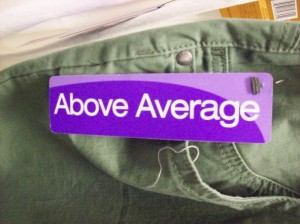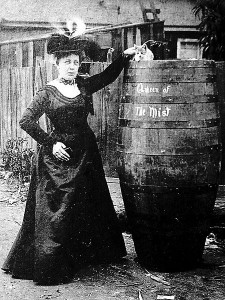Are you average or above average? By definition, you are probably average although I like to assume that most readers of Productivity501 are above average. But for the moment, lets assume you are average. How can you become above average?

Time is the great equalizer. Everyone has the same amount of time–whether you are average, below average or above average. The simple difference between people who are average and those who are above average is that above average people spend more time on the things that really matter.
While this is simple to state, identifying the things that are really important and that really matter can be surprisingly. When Bill Gates dropped out of Harvard, it probably didn’t look like he was focusing on the things that were really important, but it turns out he was.
Lots of decisions in life involve taking calculated risks. You have to ask yourself, “what are the chances that this will pay off and how big might that pay off be.” You may not be able to predict the future, but you can at least avoid doing activities that only have potential for a very low pay off and have a very low chance of success.
What’s amazing is that so many people don’t even do this. They will invest huge portions of their life in things that have very little chance of succeeding or that have very little chance of being valuable if they do succeed. Sometimes they invest in both.
In 1901 a school teacher in her 60s named Annie Edson Taylor was concerned that she wouldn’t have enough money. She had traveled around different parts of Michigan looking for work and even traveled to Texas and Mexico unsuccessfully looking for work. Her husband had died in the Civil War and she was looking for a way to provide for herself in her later years.

Her solution? She had some friends seal her in a barrel and became the first person to go over Niagara falls. While she briefly made a bit of money speaking about it, she never really made any significant money off of it. Looking at the chances of success and the potential payback, you wonder how in the world she convinced herself to try such a stunt. No one had gone over the falls before although they had sent a cat over in a barrel, so it wasn’t like she had at lot of reason to believe she’d survive.
Even if she survived, it was dubious whether or not she could make any money off of it. If she had skills as a speaker–maybe it would work, but plunging over the Falls doesn’t automatically make you a decent orator.
This is the same way many people choose what activities to invest in. They randomly select something without looking at the probability of success and without looking at the potential if they do succeed.
Being above average means being deliberate about how you choose to spend your time. It means choosing activities that are likely to be profitable rather than simply trying random things and hoping some how you get lucky.
Wait, is she survived or not?
Yes, she did survive, but it didn’t prove very profitable for her.
Interesting story… too many people are doing things without thinking about the outcome.
I mean what kind of chess player does not think about the outcome of his next move? well… failed one… :)
Being successful requires some calculated risk and a big dose of reality. You have to do the due diligence to make sure your plan is sound, but you also have to be willing to take some risks. Sometimes is takes failure to help us learn and discover what does and doesn’t work. Poor Annie must have been at her wits end to have tried that stunt!
Too much doing without thinking is no good; too much thinking without doing gets you no where. While doing/trying things with (known) high probability of success is smart. However, before becoming the smart one, you ought to gain experience and painful blow from failures, or better phrased as ‘temporary setbacks.”
Being brilliant (above average) is not doing the right thing all the time but doing the right things long enough in order to out number the wrong doings. By the way, how would you know you’re above THE AVERAGE when you don’t even know the two extremes?
How do you know if you’re above THE average? A brilliant way to check is making sure the way you are today is better than you were yesterday.
Benchmarking against yourself will show if you are better than YOUR average, but probably doesn’t tell you much about where you fall with THE average.
True, “MY” avergage might not be the same as “THE” average AT THIS VERY MOMENT. If you extend your thought a little bit, making CONTINUAL improvment to “MY” average will eventual put my beyond “THE” average. Since average people don’t make the effort to improve themselves in daily basis, having the HABIT of doing better than MYSELF is a brilliant idea IMO.
Questions to ponder:
How could you be above average when you can’t beat your own record? If you think you’re “ABOVE AVERAGE” and stop making progress you are merely “THE AVERAGE AMONG THE ABOVE AVERAGES.”
My initial point is, having the habit of doing better than my average will put me not just above my average but to my best.
Have you ever listened to the song “Everybody Wears Sunscreen?” The lyric goes something like this, “…..the race is long. At the end, you’re only with yourself…”
Good points. When I managed a department that had a help desk my assistant would produce a chart every week showing a graph of how long that weeks tickets took to resolve. Through the middle was a line that represented the average of all the previous weeks. The tech support employees knew that if they were able to keep this weeks data point below the line, we were making improvements.
Very interesting post. :-)
I have recently started thinking about what is important and prioritizing things. Man has my life become so much easier! the stress feels less when i have decided not to focus much on things like learning the guitar, improving my voice, posture, talk, topics, dress sense, walk, gestures, expressions and so on and on. I used to jump from one activity to another. But after prioritizing I’m more happier with my time investments.
In one word – BRILLIANT!
How good is it that we don’t have to wait for anyone else’s permission to fulfill the mission we have been given to fulfill in our lifetime.
Probably some of the first questions we need to ask ourselves are, ‘What is my mission? What are my peculiar gifts? What can I bring to this world to make it a better place?’
Answer those questions – and follow your heart…and look out…..brilliance may just accompany you on and into your brilliant future.